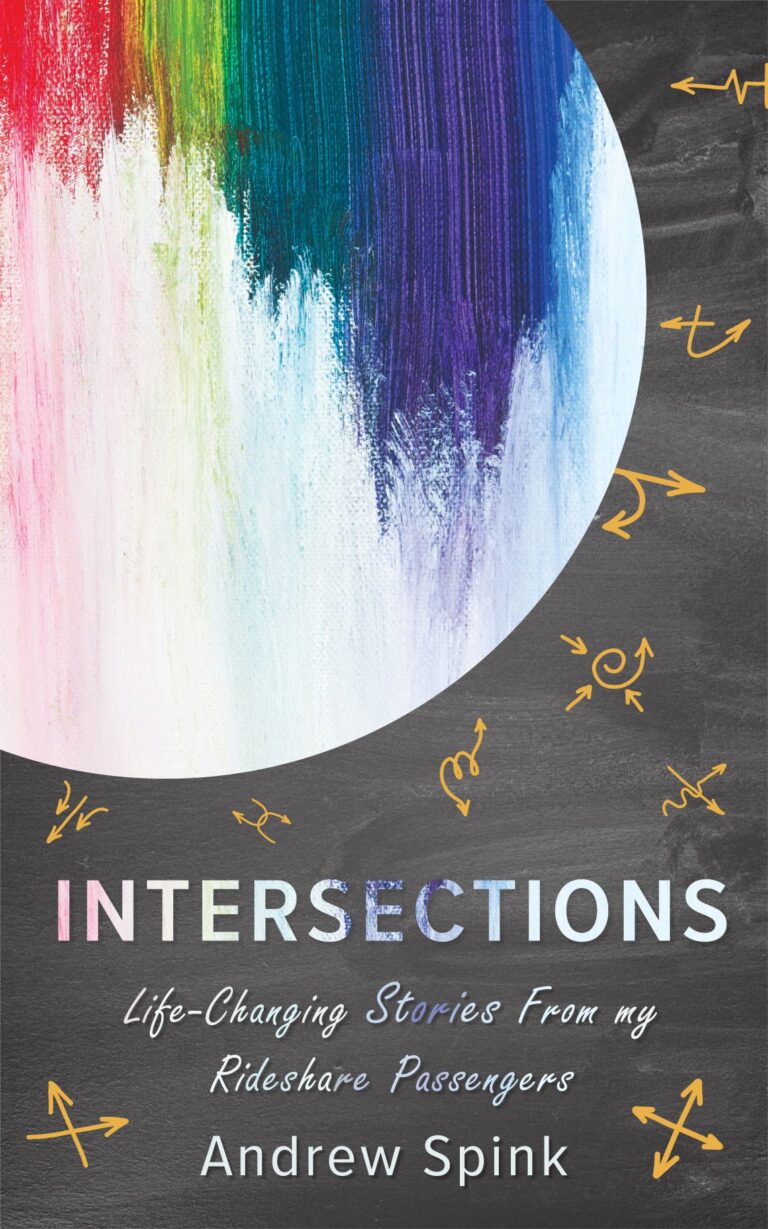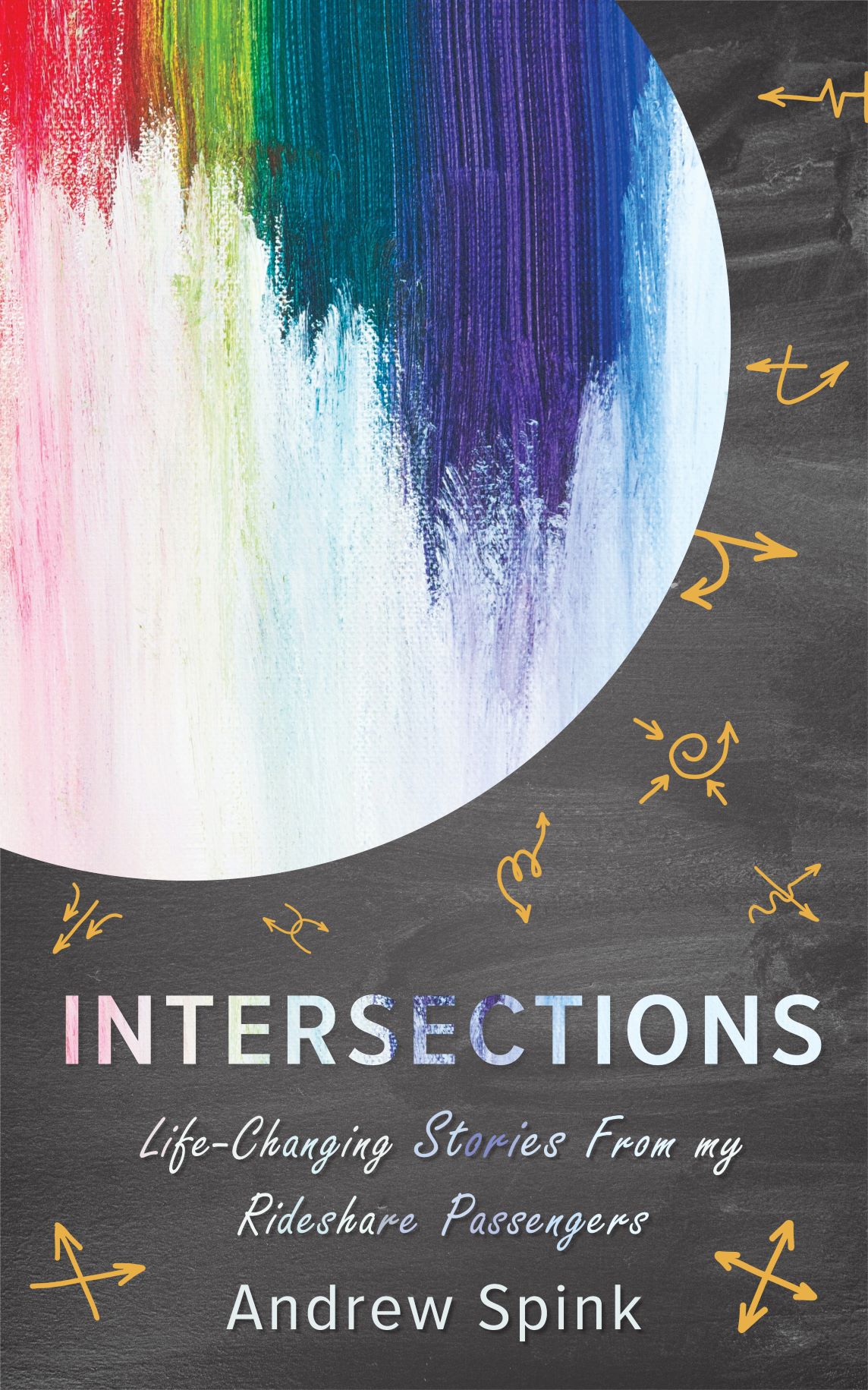It is an axiom that from New York to London, cab drivers have stories to tell. Andrew Spink’s debut collection of short stories, INTERSECTIONS, is subtitled “Life-Changing Stories From my Rideshare Passengers”, and while there is much to commend here, this description seems to speak to a profundity in these stories that is not as ubiquitous as the title makes it out to be.
The collection is divided into three sections titled “Water”, “Earth”, and “Fire”, and is preceded by a prologue and a short passage, “True Fiction”, in which the author points out that while the stories in the collection are “true”, in that they occurred to passengers he had had in his car, they are also works of fiction, because details have been changed, context added, and so forth. The opening story, “The Jumper”, certainly points more in the direction of fiction than fact. It concerns the plight of a woman in Shanghai who works for a major tech company, whose attempt to kill herself is interrupted by another employee who works in America, using a third employee with a cellphone as an intermediary. For all the drama on show, the story feels a little undercooked. The company’s sinisterness is neither used as a metaphor nor fully explained for plot purposes, and the deus ex machina – the protagonist allows the suicidal employee’s mother to speak with them on the phone at the climax, with no thought as to whether this would even be a good idea – is less than believable. The most implausible aspect of all is that a rideshare passenger would “for some reason… [trust] [their driver] with this top-secret story” – a conceit that the author gamely attempts to lampshade out of existence.
Elsewhere, there is more than one case of events being imbued with a storytelling significance that they never asked for. “Breath” is an example. It tells the story of a rideshare driver who is the first person on the scene after a motorcycle crash, and accompanies the victim to the hospital. The emotional payoff lies in the backstory of the victim, who divulges his life story to the narrator in the ambulance. The victim’s sudden recognition of the bond between him and his soon-to-be divorced wife foreshadows the narrator’s own realization of the necessity to mend fences with his own father, setting up a moving, somber ending. However, this neat vignette is followed by a second near-death experience shoehorned in towards the end, in which the narrator exchanges the company of the motorcyclist for the inside of a diner, and promptly sees a father almost choke to death in the middle of an argument with his own daughter. It is unsubtle, even given the story’s semi-comedic chops, and takes the gloss off an otherwise touching tale.
What is peculiar about the collection is that some of the stories are almost entirely unrelated to the context in which they were encountered. Given that the provenance of these stories – the back seat of a rideshare – is placed front and center in the prologue, one would expect the interactions between driver and rider to constitute an important framing device. However, this dynamic barely features in several of the stories, and two or three of them would work perfectly well if it were absent. When the framing device and the plot do cohere, the results can be spectacular. A case in point is “The Svislach”, by some distance the most well-rounded and impressive of the collection: an immigrant newly arrived in the United States to take up a tech job is staggered by his first view of Mount Rainier, having spent his entire life in low-lying Belarus. That is, more or less, the entirety of the plot; but in the neatly sketched portraits of parental figures, the subtle interplay between the tension of departing one’s home for unknown shores and the eternal ambiguities of the immigrant, Spink succeeds in communicating the complex emotions that stem from leaving the old for the new.
INTERSECTIONS would perhaps have been a better book if it had simply presented itself as a collection of unrelated short stories, a grouping for which the author did not set out to achieve thematic unity; trying to make narratological square pegs fit into round holes is always a fool’s errand. These issues aside, there are several entertaining and thought-provoking portraits of life in transition here that prove, as Spink notes, that it is the story that redefines us.
Though the framing device is not always convincing, Andrew Spink’s debut short story collection, INTERSECTIONS, contains several moving and well-told tales.
~Craig Jones for IndieReader


